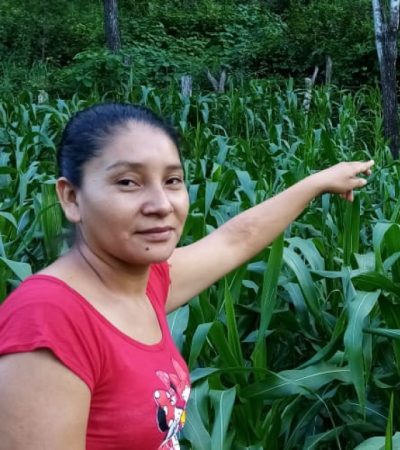In western Honduras, more than40 percent of children under the age of five are estimated to suffer from stunting, which is a result of inadequate nutrition. Without proper nutrition early in life, children’s lifelong health and productivity suffer, as do economies in countries where undernutrition is widespread.
That’s why improving nutrition, particularly for mothers and young children, is one of Feed the Future’s highest-level goals. In Honduras, some important breakthroughs in nutrition programming are paving the way toward better health and nourishment for some of the country’s most vulnerable children.
In the six departments where one Feed the Future project works, a 2012 survey showed that 35 percent of children under the age of two were anemic, which means their blood lacks adequate healthy red blood cells. Anemia often results from a long-term deficiency in iron, an essential nutrient for physical and cognitive growth and development that helps move oxygen from the lungs to the rest of the body.
These high anemia rates were puzzling, as iron supplements are widely available, so Feed the Future began working with local, regional, and national health professionals in Honduras to better understand the causes and appropriate preventative measures for anemia in this part of the country, conducting household visits to observe feeding and hygiene behaviors over the course of several months in 2014.
The findings were illuminating: specialists discovered that while caregivers were using healthy feeding practices learned in project trainings, good hygiene practices were limited or restricted in many households, especially those with dirt floors, and a large percentage of households lacked access to potable water. The team determined that many cases of anemia could be associated with a parasitic infection.
In response to this problem, Feed the Future developed an intervention plan with the Ministry of Health and the National University of Honduras (UNAH). The first phase of the plan was an intensive field study, conducted in January 2015 by a team of microbiologists, from UNAH to determine the level of parasitism in children under two years old. More than 50 percent of children tested positive for one or more types of parasites, and 30 percent of children with parasites also tested positive for anemia. The treatment phase began in February, and each child that tested positive for parasites received treatment.
Project health specialists and field staff are continuing to work closely with public and private health service providers to identify and address other factors that can contribute to the high prevalence of anemia in children under two years old. Feed the Future has developed key messages around these findings – including frequent hand-washing, avoiding coffee consumption among young children, and promoting breastfeeding in lieu of cow’s milk. This messaging is now part of all project health and nutrition activities.
This study is the first of its kind in Honduras, and Ministry of Health officials are discussing its results with policymakers and the donor community to encourage them to support additional research and, ultimately, revise health care standards to address parasitism among young children.
Also new in 2015 is the Government of Honduras’ decision to expand the inclusion of “Integrated Community Child Health” services among local health care providers who contract with the Ministry of Health. This suite of services, which aims to reduce morbidity and mortality of children under the age of five, as well as undernutrition and anemia in children under two, was introduced as part of the basic package of health services within decentralized service delivery contracts under the regional Mesoamerican Health Initiative supported by the Bill & Melinda Gates Foundation, Health Institute Carlos Slim and Inter-American Development Bank, with technical assistance from the U.S. Agency for International Development.
With support from the Feed the Future initiative and other U.S. Government programs, these services will be exponentially expanded, helping to reach more than 1.3 million people including approximately 20,000 children under two years of age in western Honduras. The Ministry of Health will also regularly monitor program performance and has assigned $1 per capita specifically to nutrition activities as part of this expansion. These government measures are crucial for long-term sustainability of nutrition improvements in the region.
These efforts demonstrate a clear commitment from the Government of Honduras to meaningfully address undernutrition through an evidence-based approach. With continued coordination on nutrition across sectors, more young children in Honduras can look forward to a brighter, healthier future.


